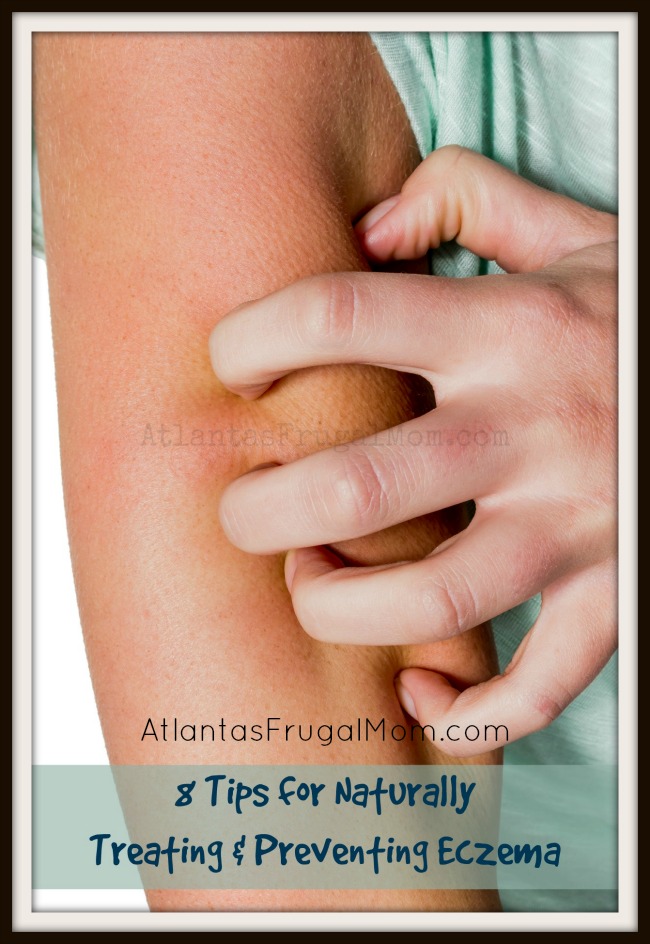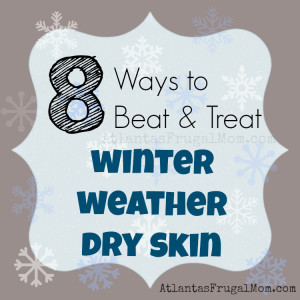When my son was about six months old, he developed a rashy-looking patch of skin on his belly. When I took him in to the pediatrician, she misdiagnosed him with ring worm. Ring. Worm. Shudder. Long story short, we don’t go to that doctor anymore, and have since gotten the correct diagnosis: eczema. My son develops small patches of dry skin, typically on the back of his knees, near his elbows, and other areas on his body.
Thankfully, his has been a mild case these last few years, but I think that’s greatly in part to taking preventative measures. There’s a whole arsenal of ways to treat and prevent eczema, but some suggestions just seem a little …extreme. For instance, our pediatrician once mentioned that its feasible to treat a flare up with a bleach bath. She walked me through the specifics, and assured me of the science behind this idea (and also stated she didn’t think it was ever something she personally could do for her child), but ….the idea of giving my toddler son a bleach bath just didn’t sound appealing.
Luckily, there are plenty of ways to treat and prevent eczema using natural methods.
8 Tips to Naturally Treat Eczema
While the exact cause of eczema in each person is a little different, studies show that stress, genetics, and even food allergens are the main culprits. Anything from gluten, eggs, soy, peanuts, to citrus and even cow’s milk can cause eczema to flare up if you’re even slightly allergic. Let’s get to the root of the issue instead of just relieving it temporarily.
1. Avoid using detergents or fabric softeners, unless they’re free of all dyes and fragrances. You can even make your own detergent, just to be safe. Use the rinse cycle twice to get rid of extra residue left behind from detergents.
2. Cook with coconut oil. Coconut milk contains lauric acid, which our bodies convert into monolaurin. Monolaurin is a compound that helps fight viruses, bacteria, and fungus. Coconut oil also moisturizes the skin, which can be helpful when dealing with eczema.
If you find that moisturizing doesn’t help, try this healthy skin sea spray.
3. Avoid fast food. Besides obvious reasons (like fast food just not being good for our bodies, and it being expensive), when you have eczema it’s important to maintain healthy immune and digestive systems. This means eating healthy foods, at least most of the time.
4. Get allergy tested. Many allergens in the air, such as dust and pollen, can increase eczema flare ups as well as asthma problems. Many folks that have eczema also have asthma.
5. Skip the topicals. While topical treatments provide immediate short-lasting relief, don’t use them in place of getting to the root of the issue. If you’re going to use something topically, try avocado or aloe vera. Mix into a paste and leave it on the skin for 10-15 minutes. Wash off with warm water.
With eczema, you should look from the inside out. Like I mentioned above, the immune system and the digestive system are both important players in this game. Keep an eye on what you’re eating (or what you’re feeding the kiddos), and even keep a food log to show the doctor. This can help tremendously, and it will also save a lot of time when it comes to figuring out the cause of your eczema.
6. Take a probiotic. Dairy-free is best, especially if you have any type of dairy allergy. Probiotics help build up healthy bacteria in your gut, which can help improve eczema symptoms.
7. Avoid caffeine. Drink water, green smoothies, and (fresh-squeezed) juices instead.
8. Bathe sparingly. I don’t mean that you should go around smelling awful, but taking a bath or shower every day isn’t usually necessary. Keep baths lukewarm and short, to prevent drying of the skin.
These tips are not for instant relief, they’re for long-lasting relief because you’ll get to the root of your eczema issues instead of just covering them up for a bit. Many factors contribute to eczema flare ups, so don’t give up if you can’t find the cause right away.
So, do you have any favorite tips to naturally treat eczema? Please comment below with any additional tips, or suggestions you might have for naturally treatment or prevention of eczema.
You may also like:
8 Ways to Beat and Treat Dry Winter Skin
Keep on saving! :o)--Barbara
**Remember, y'all, this post may contain affiliate links. I receive a small amount of compensation when you purchase from my links, which I"ll totally blow on waffle fries and sweet tea, y'all!**












